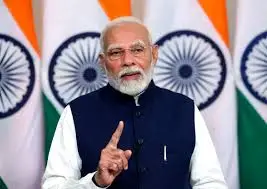Today in Politics: Can Congress go toe to toe with BJP on the nationalism narrative?

Nationalism has become a central theme in Indian politics. The Bharatiya Janata Party (BJP) has made it the core of its identity. Under Prime Minister Narendra Modi, the BJP has linked nationalism with strong leadership, cultural pride, and national security. This strategy has helped BJP consolidate a large and loyal voter base. Now, the big question is: can the Congress party effectively challenge BJP on nationalism, or will it continue to fall behind?
BJP’s Grip on the Nationalism Narrative
The BJP has built a powerful narrative around national pride. The party emphasizes India’s sovereignty, security, and cultural heritage. For example, moves like the abrogation of Article 370 and the Citizenship Amendment Act (CAA) have been used to project a firm stand on national integrity. Additionally, the government’s foreign policy initiatives highlight India’s growing role on the world stage.
Because of this, many Indians see BJP as the protector of the nation. The party’s messaging connects with people who want a strong and assertive India. By linking nationalism with patriotism, BJP has framed the debate in its favor. Critics often hesitate to oppose this narrative because it risks being branded as anti-national.
Congress Faces a Tough Challenge
Congress has traditionally promoted inclusive nationalism. This version celebrates India’s diversity, democracy, and secular values. However, in today’s polarized climate, Congress’s inclusive nationalism struggles to compete with BJP’s assertive rhetoric.
Congress leaders talk about unity and constitutional values. They emphasize social justice and pluralism. But their message has not reached or moved many voters. Critics say Congress lacks the emotional appeal and clear messaging that BJP has mastered.
How Can Congress Reclaim Nationalism?
To compete effectively, Congress needs a fresh strategy. First, it must reframe nationalism in a way that is both inclusive and powerful. India’s strength lies in its diversity, and Congress can highlight this. By focusing on constitutional values, it can appeal to voters worried about social divisions.
Second, Congress should link nationalism to governance. National pride should not just be about culture or symbols. It should also reflect India’s economic progress, job creation, and social welfare. Showing how good governance benefits the nation can create a positive narrative.
Third, engaging young people is crucial. India’s youth make up a huge voting bloc. Congress must connect nationalism with opportunities in education, technology, and innovation. This forward-looking approach can inspire younger voters.
Lastly, Congress needs stronger, clearer communication. Nationalism requires emotional appeal. The party’s leaders must speak with conviction and consistency. Without this, it will be hard to sway public opinion.
The Road Ahead: Can Congress Win?
At present, BJP leads the nationalism narrative by a wide margin. Its strong organization and emotive messaging give it a clear advantage. However, the landscape is not fixed. Nationalism in India is evolving, and so are voter expectations.
Many people want nationalism that goes beyond slogans. They want it to translate into better lives and stronger communities. If Congress can present nationalism as inclusive and linked to progress, it may regain ground.
To sum up, Congress has a challenging but not impossible task. It must offer a clear alternative to BJP’s version of nationalism. By emphasizing unity, governance, and youth engagement, Congress can compete on this key issue. Whether it can match BJP’s emotional and political momentum remains to be seen.






